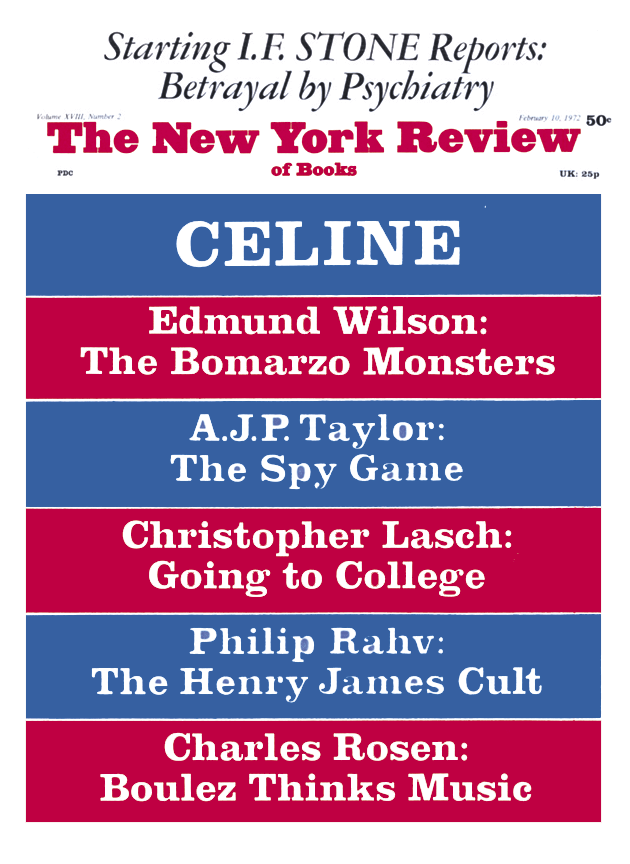In response to:
Grendel and Beowulf Were Two Pretty Boys from the December 30, 1971 issue
To the Editors:
Nobody likes a bad review (or reviewer), but Mr. Bateson is entitled to his personal judgment of my Beowulf translation [NYR, December 30]. On the other hand, Mr. Bateson is English, not American, and given the very sharp differences between contemporary English and American poetry it is not surprising that no English critic has ever had a kind word to say about any of my Old English translations. American critics, and book buyers, have taken a rather different attitude. Mr. Bateson’s discussion of my use of enjambement could have come straight out of a TLS condescension to almost any good American poet.
But Mr. Bateson’s view of Beowulf is quite another story. He and Mr. Kingsley Amis and presumably some others may think the poem second-rate; Mr. Bateson may, and obviously does, feel thereby entitled to deride my very deep feeling that the poem is distinctly first-rate; but the critical consensus, and I do not mean among professional medievalists, runs very differently. That standard American compendium, the Encyclopedia of Poetry and Poetics, has Richard Harter Fogle saying that “the greatest Anglo-Saxon literary product is the Beowulf…Beowulf is a folk epic not unworthy of comparison with the Iliad and the Odyssey.” Emile Legouis, writing in French, talks of the poem’s “sustained noble gravity of tone” and the “somber imagination and the sadness of a northern landscape [which] have united to paint this powerful picture.” He notes that “every incongruity which analysis can discover disappears in the movement and the style of the poem.”
The American classicist Rhys Carpenter, comparing epics from different traditions, points out that “the dramatic unity which is so strong in Beowulf has been shattered in the Odyssey, where a string of disconnected and unrelated adventures has been substituted for the coherence of time, place, and person which might be supposed essential.” The American linguist, John Nist, writes of Beowulf’s “immense excitement”—and to sneak in one medievalist, American of course, Stanley Greenfield sums it all up by referring to “the magnificence of Beowulf as an epic or heroic poem.”
I should like to give the last word to that part-American, and frequent New York Review-er, W. H. Auden:
The only Americans I can possibly imagine as British are minor poets with a turn for light verse like Lowell and Holmes; and the only British poets who could conceivably have been American are eccentrics like Blake and Hopkins.
Burton Raffel
Toronto, Ontario, Canada
F. W Bateson replies:
I am particularly sorry that Mr. Raffel finds “a TLS condescension” in my comment on a peculiar enjambment he uses. I have spent many hours and days attacking—though never anonymously—that indispensable if infuriating periodical’s anti-Americanism. The complex fate of being an Englishman has its embarrassing moments. As for Beowulf himself, it is good to know the old bruiser has achieved respectability in the States. But I wouldn’t advise his promoters to enter him in the same ring with the author of the Odyssey.
This Issue
February 10, 1972


